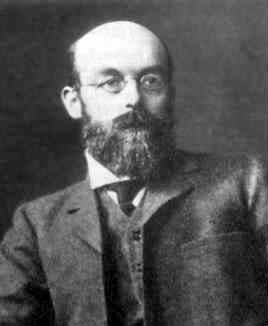


 تاريخ الرياضيات
تاريخ الرياضيات
 الرياضيات في الحضارات المختلفة
الرياضيات في الحضارات المختلفة 
 الرياضيات المتقطعة
الرياضيات المتقطعة
 الجبر
الجبر
 الهندسة
الهندسة 
 المعادلات التفاضلية و التكاملية
المعادلات التفاضلية و التكاملية 
 التحليل
التحليل
 علماء الرياضيات
علماء الرياضيات |
Read More
Date: 25-2-2017
Date: 25-2-2017
Date: 26-2-2017
|
Died: 14 January 1931 in Northampton, England

William Johnson's mother was Harriet Brimley from Cambridge, while his father, William Henry Farthing Johnson, owned and ran Llandaff House School in Cambridge. It was a large family with William having one older brother and three older sisters. Two of William's brothers, George William Johnson and Reginald Brimley Johnson, went on to become authors. William, the subject of this biography, was a pupil at the school in Cambridge where his father was the headmaster. He went on to study at Perse School in Cambridge, and at the Liverpool Royal Institution School. In 1879 he entered King's College Cambridge becoming 11th wrangler in the mathematical tripos of 1882. Johnson held various temporary positions around Cambridge for the next 19 years [2]:-
For some years he gained his living as a mathematical coach in Cambridge, until openings were found for him in teaching for the moral sciences tripos and as a lecturer in psychology and in the theory of education to the Cambridge Women's Training College and for the university teachers' training syndicate.
He married Barbara Keymer Heaton in 1895 who was the daughter of a lecturer in chemistry at Charing Cross Hospital, London. During these nineteen years of holding temporary positions he published three papers on Boolean logic and one on probability. In 1902 he obtained a Fellowship at King's College and taught there as Sidgwick lecturer in moral sciences. He was a shy, sickly man but a popular and respected teacher. However his personality meant that he spent most of his time on his own in his rooms in King's College and life became harder for him after his wife died in 1904. However he taught logic and mathematical economics, publishing important works in both areas. In the area of logic he published papers such as The logical calculus (1892) and Analysis of thinking (1918), both of which appeared in Mind. Perhaps his most famous work on mathematical economics was The pure theory of utility curves which appeared in the Economic Journal in 1913.
He is most famed, however, for Logic (1921, 1922, 1924), a work that one of his students persuaded him to publish. Logic is in three volumes, the fourth on probability was never finished, but the parts which were written were published in Mind after his death. Logic won him considerable fame leading to his election as a fellow of the British Academy (1923) and to the award of honorary degrees from universities such as Manchester (1922) and Aberdeen (1926).
Johnson viewed probability as expressing logical relations between evidence propositions and hypothesis propositions. He was opposed to the frequency interpretation of probability. His views on the foundations of probability theory influenced Keynes and others.
In [5] some aspects of his work is discussed:-
How do Bayesians justify using conjugate priors on grounds other than mathematical convenience? In the 1920s the Cambridge philosopher William Ernest Johnson in effect characterized symmetric Dirichlet priors for multinomial sampling in terms of a natural and easily assessed subjective condition. Johnson's proof can be generalized to include asymmetric Dirichlet priors and those finitely exchangeable sequences with linear posterior expectation of success. Some interesting open problems that Johnson's result raises, and its historical and philosophical background, are also discussed.
We noted above that he was a shy man with some health problems yet, as we mentioned above, he was an excellent teacher [2]:-
He would sit by a fire at Llandaff House, wrapped in the red shawl which became so characteristic of him, conversing with undergraduates. His pupils (who numbered a large proportion of those reading moral sciences in the university) and people who attended his lectures, which were delivered conversationally and with frequent digressions, were aware of a lovable personality and were infected with his exacting subordination of originality to clarity and truth.
Despite his shyness, Keynes remarked that Johnson was an excellent conversationalist. His quiet life in College did not mean that he had no outside interests for he loved playing the piano, which he did well entertaining guests in his rooms with his playing, and took an interest in football and mountaineering. He continued lecturing through the early part of 1930, but was then taken ill and died in St Andrew's Hospital, Northampton.
Articles:



|
|
|
|
علامات بسيطة في جسدك قد تنذر بمرض "قاتل"
|
|
|
|
|
|
|
أول صور ثلاثية الأبعاد للغدة الزعترية البشرية
|
|
|
|
|
|
|
مدرسة دار العلم.. صرح علميّ متميز في كربلاء لنشر علوم أهل البيت (عليهم السلام)
|
|
|